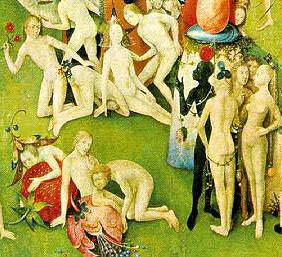The Gnostics - releasing the light within
A history of pantheism and scientific pantheism by Paul Harrison.
Are you a pantheist? Find out now at the Scientific Pantheism site. 
I am sown in all things; and whence thou wilt, thou gatherest me, but when thou gatherest me, then gatherest thou thyself.
 |
Garden of earthly delights (detail) Hieronymus Bosch
Unlike Mohammed, unlike the Buddha, there is no reliable body of sayings or teachings of Jesus which represent his own views beyond reasonable doubt. The four gospels are only four out of dozens that were whittled down by the formation of the church canon, and by censorship and physical destruction of rival texts.
With no authoritative statements from Jesus himself, the field lay wide open for a dizzying range of interpretations. The first centuries of Christianity saw a luxuriant flowering of sects which all used the name of Christ, but differed dramatically in their teachings and practice. Many of these sects were known as Gnostic, and offered exotic blends of Christian, Platonic and Zoroastrian ideas.
Two of the Gnostic gospels - the Gospel of Thomas and the Gospel of Eve - have a clearly pantheistic tone in places. They state that God or Christ is present in everything and everyone. Yet they are not monistic or world- affirming. The divine light has to be liberated from the darkness of matter imprisoning it.
The Gospel of Thomas was found at Nag Hammadi in Egypt among a cache of other Gnostic documents. It plainly rejects the world, the flesh and woman. It probably originated in Syria in the second century AD, and may have been used by the Manicheans. The Gospel of Thomas tells us that the world and the body are corpses. The real kingdom is of light, present inside dark matter.
The Gospel of Eve is known only from one or two short quotations from the great heretic-hunter Epiphanius (310/20 - 402), bishop of Salamis. He tells us that it was used by certain Gnostic sects with lurid and bizarre beliefs and sexual practices.
Epiphanius' testimony carries weight, because he admits that he himself fell in among them. He reports that they shared their women in common. They celebrated sexual orgies in which partners were swapped. Coitus interruptus was the normal practice. Semen was collected and offered to the Lord as the body of Christ, before being consumed. The Gnostics also consumed women's menstrual blood.
The theology behind the lechery was anything but world-affirming. It varied from one sub-sect to another. In outline the material world was ruled by an evil "archon" or intermediate deity. The bodily flesh belonged to this archon, and would not be raised up.
The power of the soul was found in semen and menses. But allowing semen to beget children in this world would play into the hands of the evil archon. So if by accident a woman fell pregnant, the sect would abort the foetus. They would pound it in a mortar, mix it with honey and spices, and eat it.
The beautiful women in the sect used to set themselves out as bait to recruit new followers. Some formed a male elite called Levites, who did not have sex with women but only with each other.
Jesus himself, they said, was the first teacher of these practices. He took Mary (probably Magdalene) to a mountain, took a woman out of his side and had sex with her, then drank his own sperm saying: "Thus we ought to do, that we may live." The sect even claimed that when Jesus at the Last Supper spoke of eating his flesh and drinking his blood, he was referring to this practice.
Poor Epiphanius prayed to God, resisted the women, and freed himself from the sect. He then reported them to the bishops, who drove eighty of them from the city.
The accounts and texts are from: Wilhelm Schneemelcher, New Testament Apocrypha, James Clarke & Co-Westminster/John Knox Press, Cambridge and Louisville, 1990, and Philip Amidon, The Panarion of St Epiphanius, Oxford University Press, 1990.
Selected passages.
|
The Gospel of Thomas -
The kingdom is within you and outside you.
Jesus said:
If those who lead you say to you,
See, the kingdom is in heaven,
then the birds of heaven will go before you.
If they say to you,
It is in the sea,
then the fish will go before you.
But the kingdom is within you, and it is outside of you. [Schneemelcher, op cit, 3]Recognize what is in front of you, and what is hidden from you will be revealed to you, for there is nothing hidden that will not be made manifest. [Schneemelcher, op cit, 5]
Jesus said: I am the light that is above them all. I am the all; the all came forth from me, and the all returned to me. Cleave a piece of wood: I am there. Raise up a stone, and you will find me there. [Schneemelcher, op cit, 70]
If you do not fast to the world, you will not find the Kingdom [Schneemelcher, op cit, 27]
His disciples said to him: "On what day will the repose of the dead come into being, and on what day will the new world come?" He said to them: "What you await has come, but you do not know it." [Schneemelcher, op cit, 51]
His disciples said to him: On what day will the kingdom come? [Jesus said] It will not come while people watch for it; they will not say: Look, here it is, or: Look, there it is; but the kingdom of the father is spread out over the earth, and men do not see it. [[Schneemelcher, op cit, 113]
Gospel of Eve - I am thou and thou art I.
I stood upon a high mountain and saw a tall man, and another of short stature, and heard something like the sound of thunder and went nearer in order to hear. Then he spoke to me and said: I am thou and thou art I, and wherever thou art, there am I, and I am sown in all things; and whence thou wilt, thou gatherest me, but when thou gatherest me, then gatherest thou thyself. [Epiphanius, Panarion, 26.3.1]
They say that the same soul is scattered about in animals, beasts, fish, snakes, humans, trees, and products of nature. [Epiphanius, Panarion, 26.9.1.]
And the pitiful pair, having made love, then proceed to hold up their blasphemy to heaven, the woman and the man taking the secretion from the male into their own hands and standing looking up to heaven. They hold the impurity in their hands and pray . . and say "We offer you this gift, the body of Christ." And then they consume it, partaking of their shamefulness, and they say: "This is the body of Christ and this is the Pasch for which our bodies suffer." . . When they fall into a frenzy among themselves, they soil their hands with the shame of their secretion, and rising, with defiled hands pray stark naked, as if through such an action they were able to find a hearing with God. [Epiphanius, Panarion, 26.4-5]
If one of them fails to anticipate the immission of the seed from the natural effluence and the woman becomes pregnant, then listen to something even more dreadful which they dare to do. Extracting the foetus at whatever time they choose to do the operation, they take the aborted infant and pound it up in a mortar with a pestle, and mixing in honey and pepper and some other spices and sweet oils so as not to become nauseous, all the members of that herd of swine and dogs gather together and each partakes with his finger of the crushed-up child. [Epiphanius, Panarion, 26.5.]
SCIENTIFIC PANTHEISM
SCIENTIFIC PANTHEISM reveres the universe as the only real divinity,
and nature as a sacred temple.
It fuses religion and science, and concern for humans with concern for the earth.
It provides the most solid basis for environmental ethics.
It is a religion that requires no faith and no revelation,
only open eyes and a mind open to evidence,
It has no guru other than your own self.
For an outline, see the Scientific
Pantheism site.  Top.
Top.
Scientific Pantheism index |
|
 Elements of Pantheism,
An overview of pantheist history, theory and practice. Includes almanac and
calendar. |
 
 The Finest of Religion, Science,
Nature and Philosophy Bookstore |
Suggestions, comments, criticisms to: Paul Harrison, e-mail: pan(at)(this domain)
©Paul Harrison 1996.

